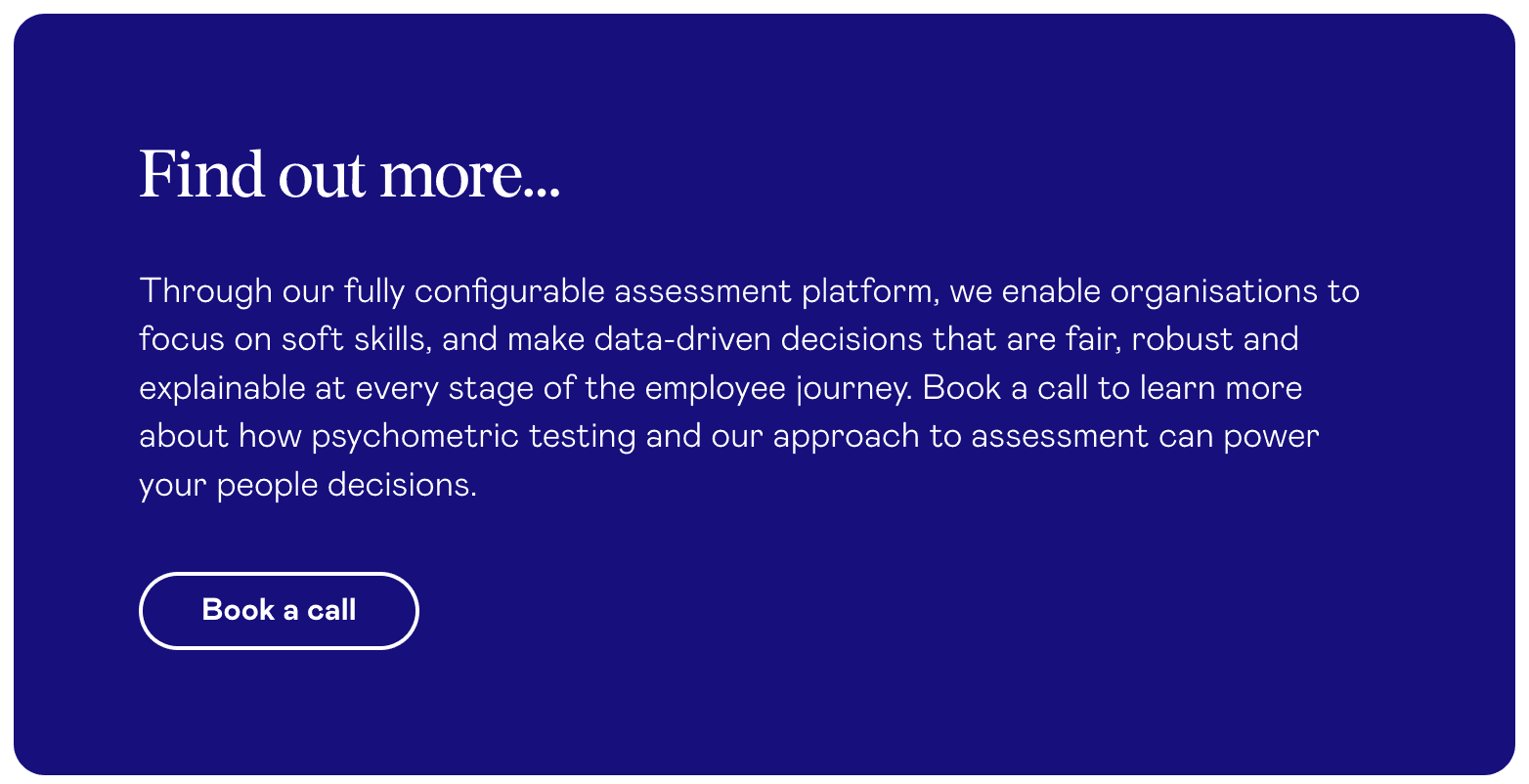Take a sneak peek of the product with an interactive tour | View now
The Recruiter’s Guide to Psychometric Testing

Psychometric tests have a history of over 100 years. Modern psychometric tests have their roots in Charles Darwin’s cousin, Sir Francis Galton, who was fascinated by individual differences. And, after being introduced in the late 1800's, psychometric tests also featured during the world wars, being used as a tool to assess recruits for any neuroses. The tests administered back then were mainly personality tests, and the role that psychometric tests have taken on since then has drastically changed.
What is psychometric testing in recruitment?
Psychometric testing measures capabilities and personality traits that help determine how well a candidate fits a job role. The tests, developed scientifically, are designed to be objective and unbiased. They are often used once recruiters or HR professionals have decided that a candidate has fulfilled all the initial requirements for a position after the screening, interviewing, and background checks. These psychometric evaluations provide hiring managers with detailed insights and richer data about candidates' personalities, mental capabilities, aptitudes, and skills.
Common psychometric tools for hiring include:
- Aptitude tests: These tests are designed to assess candidate's various cognitive abilities. They often include exercises to measure error-checking, numerical reasoning, logic reasoning, inductive or diagrammatic reasoning, and verbal reasoning.
- Behavioural tests: These tests are designed to showcase candidate's natural strengths and personality traits. They often include sections regarding a candidates likes, dislikes, goals, and abilities.
- Assessment day exercises: These exercises are based on human interaction assessments, and can include activities like group exercises and role play simulation.
These tools, which will be outlined in more detail below, provide critical information during the funnel of the recruitment process and when making the final hiring decision.
Why use psychometric testing in recruitment?
Candidates are typically assessed by reviewing their CV, going through a series of interviews and using a task or project to evaluate specific skills and aptitudes. So, why do employers use psychometric tests in addition to this process? Well, because psychometric tools in recruitment offer much more detailed and insightful data than the traditional assessment methods alone. The sum parts of the assessment data, when put together, lead to a better quality of decision making when it comes to the final recruitment decision.
These psychometric tools assess some of the following:
- Aptitude and personality
- Communication style
- Emotional intelligence
And all other behaviours that relate directly to the role for which they are being considered. These insights allow employers to determine how well a candidate might work in a team, their overall management style and their willingness to follow rules or take calculated risks, for example. Understanding more about a candidate's cognitive ability and personality traits and the associated test results are invaluable data for hiring managers. And finally, one of the reasons recruiters use psychometric tests is that these test results provide meaningful value long after the initial recruitment process has finished. They do much more than reaffirm the quality of the recruitment decision. They equip hiring managers with the information needed to make informed decisions that help shape future career progression conversations and ensure continued high job satisfaction and engagement levels.
What are the different types of psychometric tests?
There are several key types of psychometric tests.
Aptitude Tests
The main goal of aptitude tests is to assess various cognitive abilities. Typically, aptitude tests contain two primary assessments, namely a numeracy test and a literacy test. Sections may accompany these on spatial awareness, abstract reasoning, deductive reasoning, and more. The numeracy section consists of assessments relating to numerical literacy and numerical reasoning. While numerical literacy questions examine basic calculation skills, numerical reasoning questions require a higher application of interpretation and analysis. The verbal section also consists of two main types of questions which generally consist of text analysis and linguistic-based questions. The text analysis questions require basic reading comprehension skills and drawing logical conclusions from short passages. The linguistic-based questions include word analogies and odd-one-out questions.
Behavioural Tests
As different jobs require different personalities, behavioural tests highlight the specific personality traits particular roles need. Each employer chooses a different method to examine these traits: personality questionnaires, leadership tests, motivation tests, and/or situational judgement tests. Usually, the tests aim to examine candidates in critical areas such as assertiveness, social skills and tendency to dominate. On the other hand, situational judgment tests consist of an array of questions that examine how a candidate reacts to different workplace situations.
Assessment Day Exercises
And finally, organisations will often use assessment day exercises. These exercises are based on human interaction assessments. Unlike aptitude and behavioural tests, these exercises do not come in a written test but are carried out by assessors and psychologists. The time constraints a candidate experiences during assessment day exercises are intended to increase pressure and examine the candidate's ability to cope. The two most common exercises in this situation are role-play simulation and group exercises. So, when it comes to psychometric testing, hiring managers have a variety of tools they can use to assess a candidate's strengths and weaknesses and use them to offer the candidates a recruitment process full of variety and interest.
What role will technology play in psychometric testing?
Digital Transformation
Digital transformation is fuelling new ways of working in almost every sector, and psychometric test assessments are becoming even more accessible thanks to the rapid adoption of new technologies. New technologies offer innovative breakthroughs in the way recruiters can assess people. Mobile technologies, including smart devices and tablets, will become common ways of undertaking assessments. This presents some formidable challenges in terms of ensuring standardised test conditions. However, those organisations incorporating these cost-effective and candidate-friendly technologies into their testing processes will differentiate themselves from their competition. We will see more virtual reality hiring and high-tech simulations extending the psychometric assessment toolkit. This will enable employers to see how candidates respond under pressure to challenging situations in the same way pilots are screened and trained using challenging simulation exercises. This approach is, in many respects, a far more objective and robust way of measuring performance and potential. This is particularly true in high pressure, changeable or unpredictable situations.
Artificial Intelligence comes of age
Artificial Intelligence will also play a significant role in minimising subjectivity in assessing psychological assessment tests. Some companies already are introducing artificial intelligence to help minimise this subjectivity, especially when collecting and analysing interview data. And a growing number of tech companies are offering smart interview recording and analysis technologies, including video screening via laptops and smart devices, which is a trend that is set to grow significantly.
Gamification and engagement
Gamification will begin to disrupt psychometric assessment tests used in selection by using online gaming apps to test a range of abilities, including thinking styles, verbal and numerical reasoning and interpersonal styles. This approach has the advantage of improving the candidate experience and minimising bias in measurement caused by factors such as test anxiety, which can occur when using more traditional tests.
User experience is key
User experience will become even more paramount in the design of psychological assessment tests because we now live in a world where end-user experience and the employer brand are essential. This applies to the world of online assessments as much as anything else. Many assessments are still lengthy and dull. They sometimes struggle to provide a rich ongoing user experience following test completion with no link to development and continued performance improvement. In a world of immersive digital experiences and increasingly short attention spans, assessment designers will need to use technology to offer more concise, more focused assessments. Using more engaging approaches such as game-based assessments, interactive rating formats, and virtual or augmented reality technology will allow recruiters to assess how best to combine psychometric rigour with highly engaging formats.
Reskilling
Psychometric assessment tests which use technology effectively will enable organisations to better understand peak performance by offering a much sharper focus on productivity gains and building a work culture of excellence. This will accelerate the move away from measuring ‘normal’ ranges of behaviour and performance to predicting qualities driving peak performance such as strengths, talents and motives. This is key in the future world of work in which companies will hire for cognitive dexterity and look for people capable of being reskilled and retrained. Gone will be the days of ‘pigeon-holing’ personality types and abilities into broad, oversimplified categories.
The importance of diversity
And finally, technology will allow psychometric assessment tests to focus on diversity and uniqueness. Some current tests fail to consider the vast range of differences that make us unique, including the strengths, talents and different ways we achieve our results. Oversimplified personality assessments can also fail to account for the complex and fast-changing person-situation interactions evident in today's organisations. Assessments can better account for these by ensuring employees get 360-degree feedback on how their qualities and behaviours are perceived by co-workers and other stakeholders, including measuring how their strengths and behaviour play out in times of rapid change and stress. Some psychometric tests assessments may not stand the test of time as we move into the new digital age. To future-proof your organisation and achieve clear talent outcomes, you should experiment with some of the latest tools, all of which are designed to engage and pinpoint a candidate’s uniqueness and diverse talents, as well as measuring their specific job-based skills.
Advantages of psychometric testing
As with all assessment tools, psychometric testing works best when used as part of an overall assessment strategy. But, the next time you weigh up whether it should be part of your process, remember these four things.
1. It provides excellent predictive insights about your candidates
Psychometric testing gives you excellent predictive insights about your candidate. It reveals beyond what is mentioned on a candidate’s resume and efficiently assesses the strengths and weaknesses of your potential employee. And don’t forget that psychometric assessments also help recruiters develop a career plan for candidates within the company to find the right way to use their identified talents and skills.
2. It's efficient and cost-efficient
A reliable psychometric test can supply within hours may take several months for an organisation to know about a person. Psychometric assessments reduce or diminish your chances of bad hires and, crucially, can include or exclude candidates going through the process more quickly, leading to greater efficiency and focus on the suitable candidates.
3. It creates a fair and unbiased recruitment process
They can help an organisation maintain standards in objectively measuring personality traits and aptitude and act as a strong filter, especially in organisations with a high focus on cultural and values alignment as screening criteria.
4. It's advantages span an employee's entire career cycle
Psychometric assessments indicate future potential, leadership orientation and learning agility that enable hiring managers to make important workforce management decisions.
As part of an overall assessment strategy, psychometric testing offers companies a source of rich and varied data from which to make their hiring decisions. Used well, it can significantly increase your chances of making the right people decisions and developing them into your future high performers.
